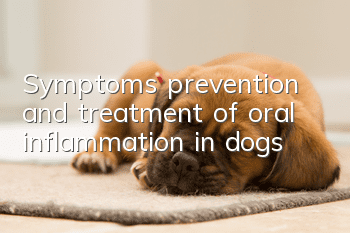Symptoms, prevention and treatment of oral inflammation in dogs

Some people often suffer from oral inflammation. Although it is not a serious problem, it is still quite painful. So dogs also have oral inflammation. Today we will talk about what are the symptoms of oral inflammation in dogs? How to treat dogs Oral inflammation in dogs?
1. Clinical symptoms of canine stomatitis:
Diagnosis can be made based on medical history, etiology and clinical symptoms.
1. Sick dogs refuse to eat rough and hard feed, preferring liquid feed and soft meat. They swallow the food without chewing it or chew it a few times and then spit it out.
2. Saliva increases and appears as white foam attached to the lips, or flows out in the form of strings.
3. When inflammation is severe, salivation will be more obvious. When examining the oral cavity, it can be seen that the mucous membrane is flushed and swollen, the oral temperature is increased, the patient feels allergic, and the exhaled breath has a foul odor.
4. In vesicular stomatitis, blisters of varying sizes can be seen.
5. In ulcerative stomatitis, erosion, necrosis or ulcers can be seen on the mucous membrane.
2. Drug treatment of canine stomatitis:
1. Generally, 1% saline solution, 2-3% boric acid solution, or 2-3% sodium bicarbonate solution can be used to rinse the mouth 2-3 times a day.
2. If you have a bad oral odor, you can use 0.1% potassium permanganate solution to wash your mouth.
3. When there is too much saliva, you can use 1% alum or tannic acid solution to wash your mouth.
4. When there are erosions or ulcers on the oral mucosa or tongue. After rinsing the mouth, apply iodine glycerin (1 part of 5% iodine, 9 parts of glycerin), or 2% gentian violet or 1% sulfaglycerol emulsion to the wound surface. 2-3 times a day.
5. For severe stomatitis, you can take a sulfonamide-alum mixture (10 grams of long-acting sulfonamide powder and 2-3 grams of alum in a cloth bag) or take the traditional Chinese medicine Qingdai powder, which has a good effect.
3. Preventive measures for canine stomatitis:
1. Eliminate the cause of the disease: remove foreign objects stuck on the dog’s oral mucosa, trim sharp teeth, and stop taking irritating drugs orally.
2. Strengthen care: feed liquid food, drink water frequently, rinse the mouth with water after feeding, etc.
- How to tell if a dog has a fever? Dog fever and how to treat it!
- Why is the dog licking the ground?
- What does it mean when a dog keeps staring at its owner?
- Puppy loses appetite and refuses to eat after a few bites
- How to feed a dog during pregnancy?
- Four major dog skin disease prevention tips
- Are dogs who often "lick their noses" just cute?
- How to protect Teddy dog’s food? A must-read for dog owners!
- Why is the female Teddy dog infertile for many years? It may be caused by these reasons!
- What causes bleeding in dogs?



